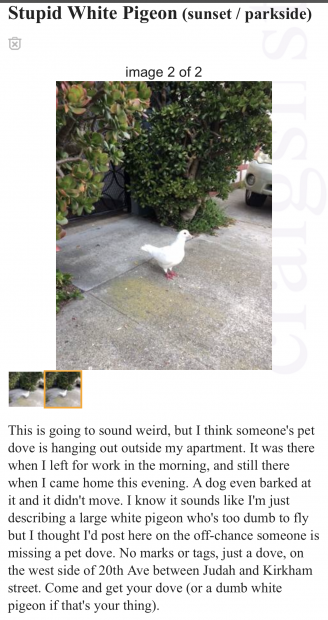Rehoming Birds
by Elizabeth Young with Cynthia Zhou, Ashley Dietrich & Rose Jensen
Perhaps your life circumstances have changed or maybe you’ve rescued a bird that needs a permanent home. Unplanned things happen sometimes, and unforeseen circumstances can lead to difficult decisions. One of the most challenging is the decision to give up a vulnerable bird when we can’t care for them ourselves. This article explains the do’s and don’ts of rehoming a pigeon or dove.
Since birds can’t rehome themselves, we have to take care of it for them. They are depending on us. And, because bird rescues are so overfull (Palomacy runs a continuous waiting list), that often means they are depending on you.
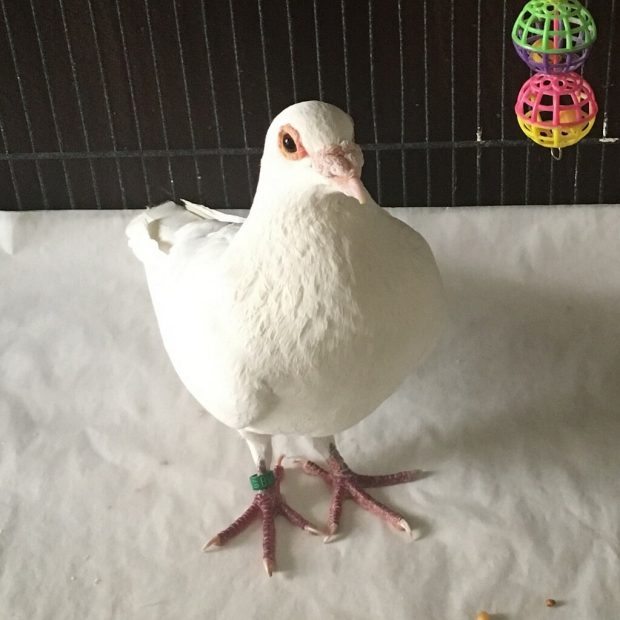
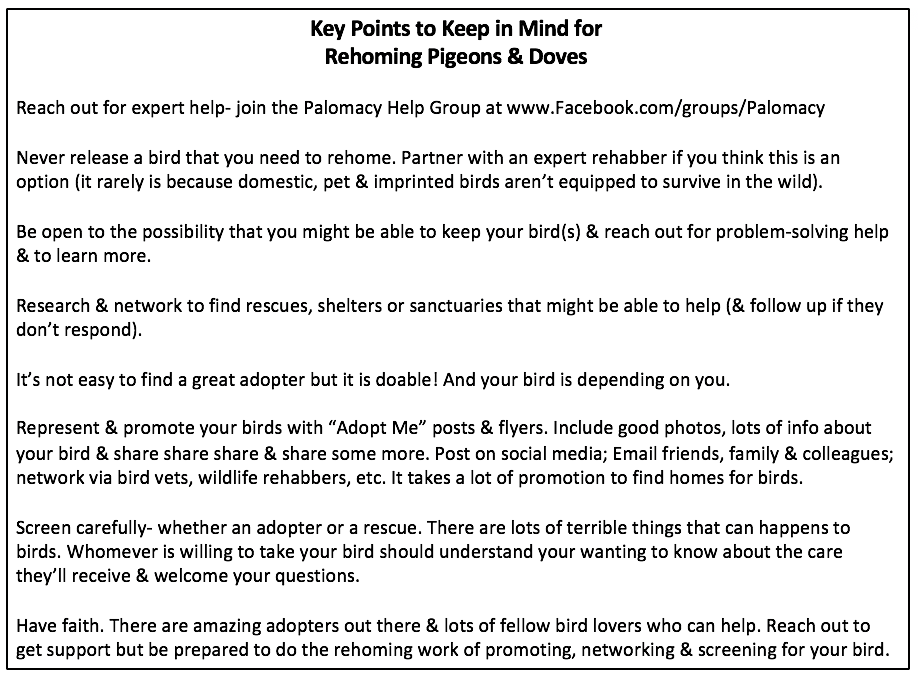
Do NOT “Release” (Especially without Expert Assistance)
Never set the bird loose in the wild – it’s a death sentence for a domestic or imprinted bird. They lack the survival skills needed to find food and shelter and to avoid danger. Doves and pigeons who are inhumanely “released” outside suffer starvation, exposure, predator attacks and have a lifespan of days.
If you have a bird that you think should be set free, please get the input of rescue experts first. Please do not release your bird into the wild. We sadly see the tragic results all too often of misguided “releases”. It is a bad idea in so many ways! If you have a pet bird (or captive flock), they are, even if not tame, most likely still imprinted and dependent on people. Pets such as Ringneck doves, Diamond doves, and domestic pigeons (Kings, Homers, Fantails, Rollers, Tumblers, even Racers, etc.) aren’t able to survive on their own. People often believe it’s symbolic to release doves (or white pigeons) to give them freedom, but in truth, it’s a death sentence for a domestic bird.

Domestic birds don’t survive being “released”
Domestic birds have neither the genes nor the developmental experience to survive in the wild. And if you rescued and raised up a young wild pigeon or dove in your home, he has imprinted on people and may never be releasable. (When we are contacted about a feral pigeon landing on a person’s head or trying to get into their car, we know that bird was raised up in a home and then released or lost. They are imprinted on humans, starving, desperate and very lucky if they get rescued.) When wild pigeons and doves are raised up by people, they need time with other birds of their kind in a safe, transitional environment to determine if they can “wild up” and survive as free birds. Some never will. Please do your homework because the world is full of people who will tell you all kinds of things. Over the years, we have crossed paths with animal shelters that “released” big white King pigeons thinking they would be fine (wrong, that is a death sentence), vets who don’t know the difference between a domestic and wild pigeon or dove (surprising but sadly common), the pigeon racers who say, ‘just feed him and he’ll rest up and come home’ and various self-professed experts who assert all kinds of untrue things. Help your bird by learning the facts. (Palomacy’s moderated Help Group is a great place to get expert assistance.)
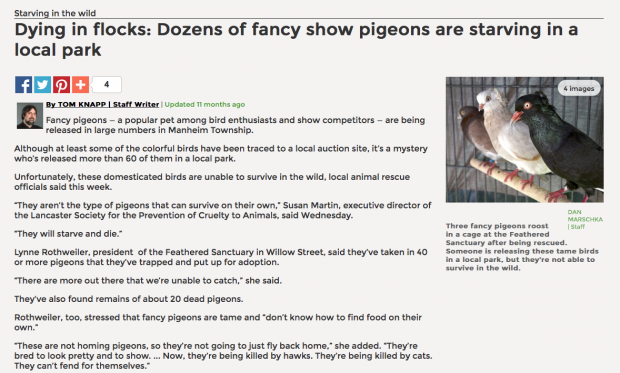
Assess the Situation
The first question to ask yourself is: Why do I have to rehome my bird? We are often contacted by people who think they can’t give a good home to a bird they have rescued or that they should rehome their bird when in fact they don’t really have to. If you are brand new to birds, we can help you (see The Story of Super Dovee and Pigeon Self Rescues Through the Cat Door and How a Little Pigeon Built a Big Aviary). If you feel your bird is lonesome or bored, there may be ways to mitigate that. (If desired, we can help you adopt a companion for your single bird. We call it pHarmony.) Sometimes people imagine that their bird would have a happier life elsewhere when their current life is actually pretty wonderful. Before displacing your bird, please connect with experts for help assessing the situation. There may be solutions or alternatives that can help you and your bird stay together. Because there are so many birds already in need of homes, yours may truly be the best home for your bird. If you’re moving, pigeons and doves are awesome little travelers and will happily move with you. Are your birds having babies and the flock has outgrown their home? We can help with that (hatch prevention). Are there behavior issues- biting, aggression, cooing or some such that is causing problems? There may be ways to manage that. Breathing issues that might be bird related? We can help advise which tests you need and how to reduce feather dander. Too much poop? Learn about bird pants.
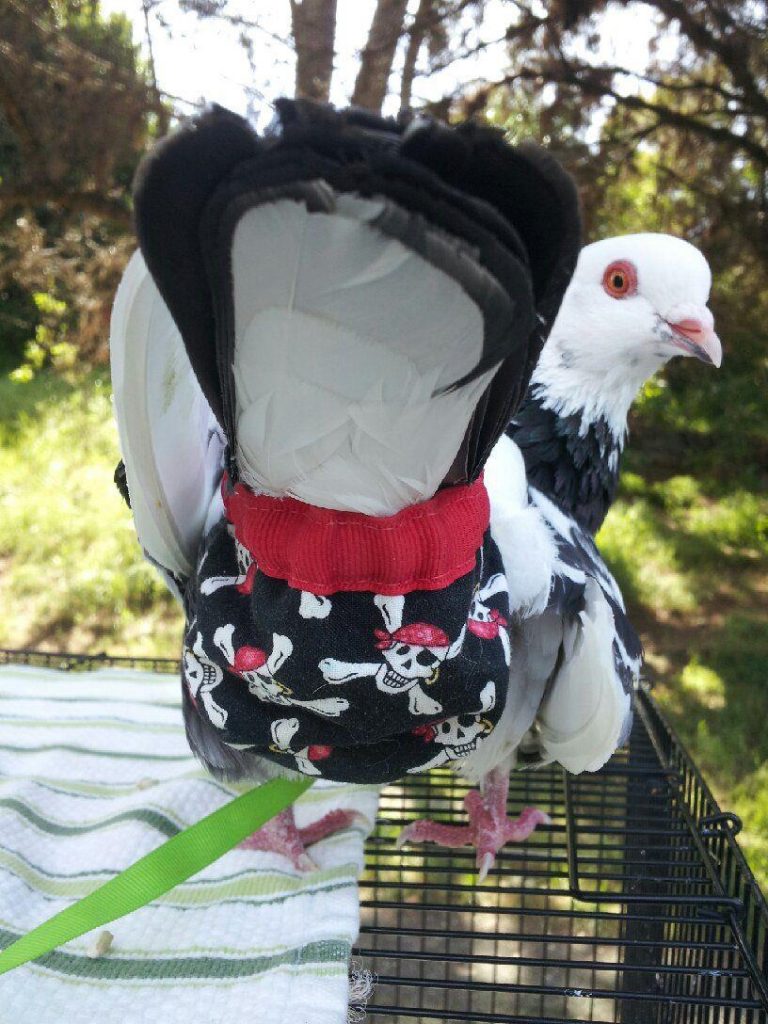
Before you make up your mind about rehoming, consult with us about why you feel you need to. We are happy to advise and support you to find the solution that is best for all involved. Joining and posting to our Palomacy Help Group is the best, fastest way to get assistance as we have a whole team of very kind Palomacy experts moderating, coaching and referring (whether in the group or privately via message or phone).
Finding a Rescue or Sanctuary
If you truly must rehome your bird, you might be able to locate a pigeon and dove-friendly rescue or sanctuary. They are not always easy to find and even when you do find one, it may take some follow up to connect with them. Rescuers are BUSY. We get more Emails, messages and calls than we can keep up with so don’t take the lack of or a delayed response personally. Do politely persist. You can ask avian vets and wildlife rehabbers in your area for referrals, do Internet searches for ‘bird rescue’, ‘bird sanctuary’, ‘animal sanctuary’, ‘farm sanctuary’, ‘pigeon rescue’, etc. and you can also ask for referrals from our Palomacy Help Group. This map shows only those we currently know about (there are more out there so don’t take the absence of one on this map to mean there are none in your area) and being on this map does not certify a safe placement. Once you connect with someone, you have to evaluate them! Please do not just turn over your bird without knowing what will happen to him and the conditions in which he’ll be kept. You must evaluate a placement yourself before handing over your bird. As a rescuer, I am not insulted when someone wants to know about our care but rather the opposite. I am thrilled that the surrenderer cares enough to inquire! If the rescue isn’t comfortable answering questions and providing info, take that as a serious red flag. Rescuers and sanctuaries are always at risk of having too many birds to properly care for, of tipping over into hoarding. There are some truly horrific fates, fates worse than euthanasia, that can befall birds. Make sure that your bird isn’t going to languish neglected in an overcrowded coop or a too small cage, be mauled and killed by predators in an unsafe enclosure or be endangered through sale to ‘feather merchants’.
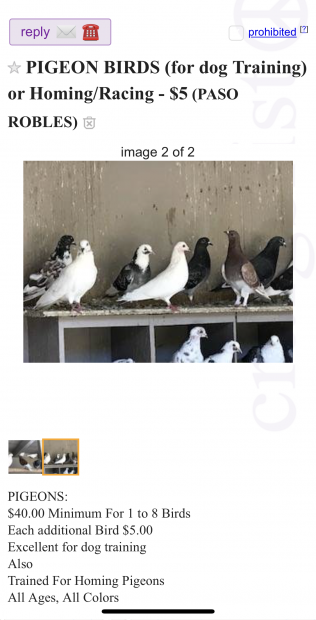
Finding an Adopter
I have been placing rescued pigeons and doves with adopters for eleven years now and I can say with authority that while it is not easy to find a great home for a bird (or flock), it is defintely doable! (See 53 Pet Doves Need Help and Rescuers Helping Rescuers and links to more inspiring adoption stories are posted at the end of this article.) There are amazingly wonderful adopters with fantastic homes to offer and the challenge is to find them.
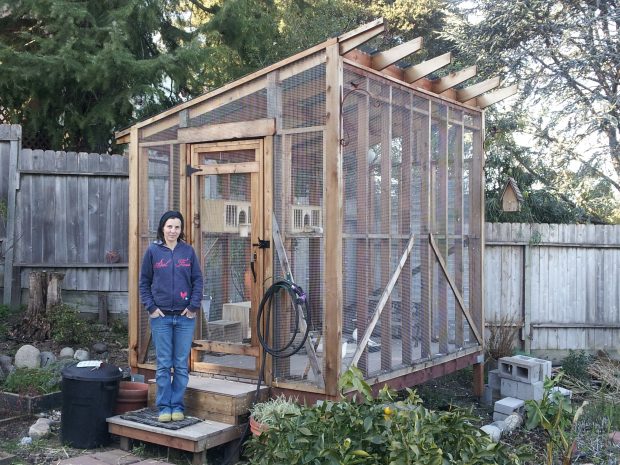
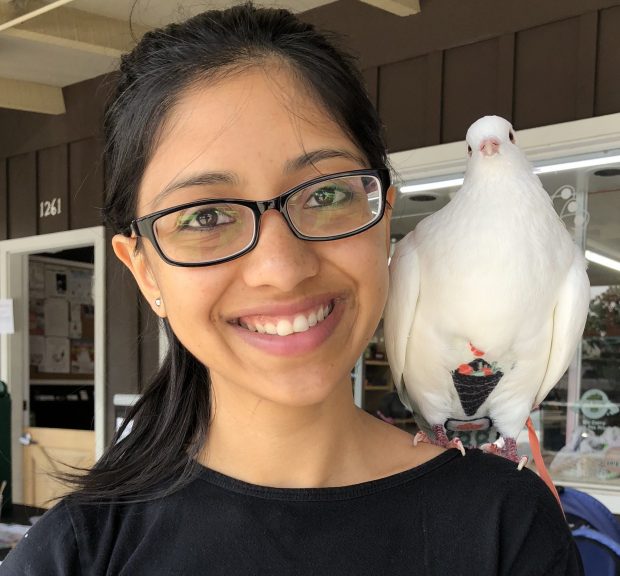
It takes time and effort to find them but they are out there! (Please note, it is incredibly easy to give pigeons and doves away because people use “surplus” birds in all kinds of terrible ways including but not limited to training hunting dogs, feeding snakes and raptors, for live target practice, inhumane ceremonies, etc. so don’t confuse giving your bird away with finding him a good home.)
Representing for Your Birds
To find a great adopter or rescue, whether for one bird or a whole flock, you need to provide and share information. When I get an Email saying, “Can you take my dove?”, I can’t even begin to answer until I have more info. Where are you located? What type of ‘dove’ is he? What’s the situation? Photos are really important because what you are calling a dove may actually be a pigeon and if so, I need to know that (we can’t put pigeons in with doves). Or your bird might be a wild rather than domestic bird or ? Good photos will help to answer a lot of questions including identifying the species of bird and providing some info about condition. And you will absolutely need photos to promote your bird to potential adopters. You don’t need expert photos but pictures that clearly show the bird (and not just cage bars) are a big help. And of course, the cuter the photo, the more interest it will generate.
These two photos show the same birds. Which one would catch your eye? This one?
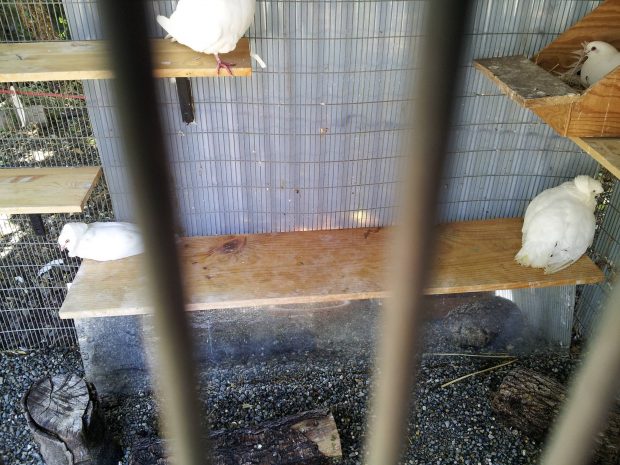
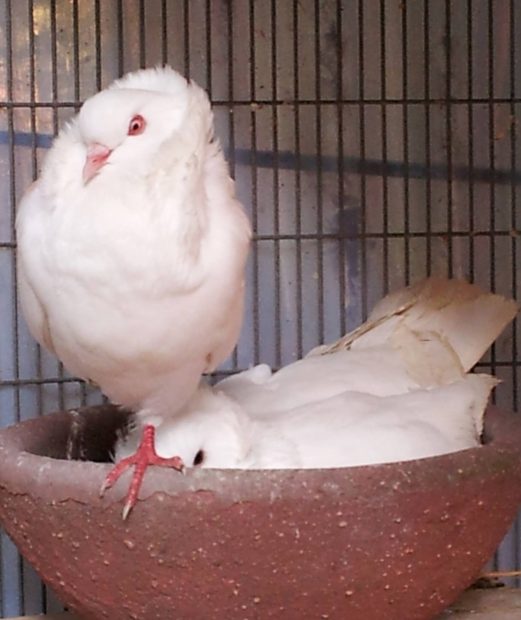
Or this one?
Also include the bird’s name, gender, age, length of time in your care, type of home he’s had, his personality, backstory, etc. All of that will help you to help your bird. If your bird has health or behavioral issues, include that information. It’s important for finding the right home. Sometimes those special-needs birds are easier to place than the others. We have found great homes for blind pigeons (Charlie), pigeons that can’t walk (Violet), doves with neurological issues (Bell), birds with beak injuries (Fleetwood & Prince), flightless birds and many more (including a 22 year old pigeon who is now 26 and more than a few senior citizen doves). Create “Adopt Me” type flyers and online posts and share everywhere (and keep sharing)! You have to reach a large audience to find great adopters for birds. Social media is your friend! Facebook is full of bird lovers, bird rescuers, and pigeon and dove groups including ours- Palomacy Help Group. Join and post and network. Lots and lots of bird lovers on Instagram too. Post on craigslist and Nextdoor and share with your friends and family. Don’t assume that no one will be interested. You’d be surprised. And don’t think that because rescues are always full up that it’s impossible to find adopters. There are lots of adopters out there and we successfully place hundreds of birds every year. We rescuers are just vastly outnumbered by all the people breeding, endangering and losing these birds.
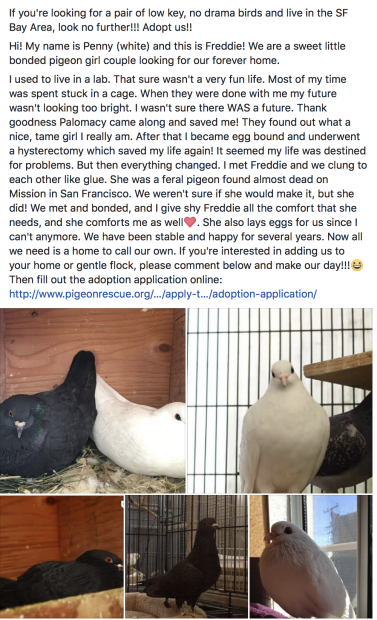
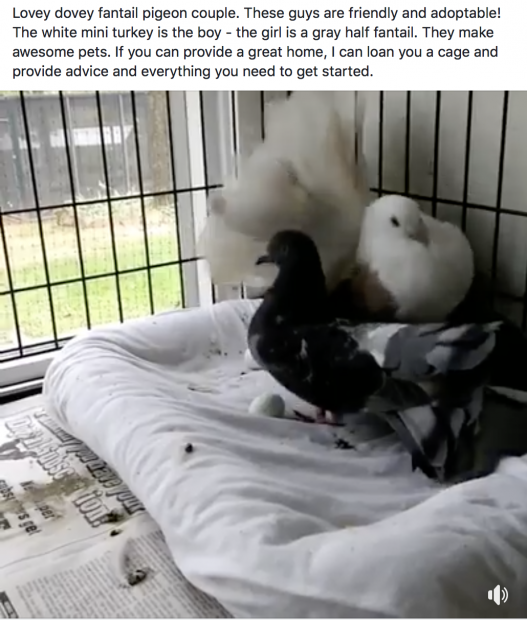
Screening a Potential Adopter or Rescue
It can take time to find a great home and the life of the bird depends on your diligence and making good decisions. Be patient and expect the process to take awhile.
Here is a summary of Palomacy’s expecations for our adopters:
-Appropriately sized, safe and uncrowded cage or aviary
-Daily fresh food, clean water, poop clean up and check for eggs
-Supervised, safe out-of-cage time (if not living in an aviary) daily
-No free flight/uncaged outside time
-Companionship- lots of your time or another bird’s (not home alone all day)
-Avian vet care if sick or injured
-Compassionate, healthy care that provides for the bird’s nutritional, physical and emotional well-being
-No breeding, birth control if bird has a mate (real eggs replaced with fake)
-A forever home (through sickness & health, moving, etc.) with a pet-care plan in case something happens to you
-No rehoming, selling, sporting or business use
-Offer to return if unable to keep the bird. (This is not desired and we can’t promise we’ll take the bird- we expect this to be a forever home.)
If rehoming your bird, make sure that your bird will be taken care of, no matter where they go. (Not sure what is truly required for care? Learn more.) If they’re going to a shelter, make sure the shelter will care for your bird and try to find an adopter rather than just automatically euthanize which happens at some facilities. If they’re going to a friend, acquaintance or adopter, make sure they know how to properly care for pigeons or doves. I try to get to know people. I ask people to tell me about their pets. You can learn a lot about what future pets’ care will be like from the care present and past pets are receiving. I ask for photos of any birds they have (and their cages) as well as a photo of where the adopted bird would live. When placing birds, I don’t need adopters to be experts but I do need them to care and to be continuously learning. Here are some questions that need to be answered before rehoming:
Where will the bird live and what type of enclosure will they be in? Birds housed outside MUST be protected in predator and rodent-proof aviaries. Housing them in an unsafe enclosure is setting them up for a really bad death. Predators such as rats will go in through quarter-size gaps (like chicken wire) and kill even healthy adult pigeons or doves. Raccoons, cats and raptors have surprisingly long limbs and can catch hold of birds through too-big gaps and literally rip them apart through the bars. Raccoons and coyotes are strong and can break into cages and aviaries that are not specifically designed to be predator-proof. Chicken wire is never safe. All it does is keep the birds in. It is useless for keeping predators out (raccoons can bite right through chicken wire). Unfortunately many companies sell cheap coops and aviaries that are not predator-proof (should be illegal!) and bird and small animal cages built for use indoors are not at all predator-proof outdoors (learn more here).
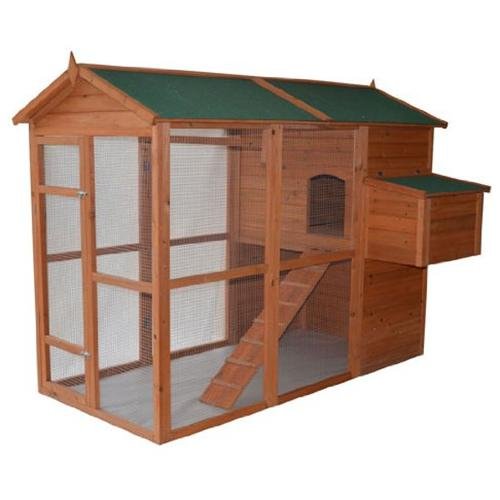
These weakly built coops need serious reinforcement to be made safe
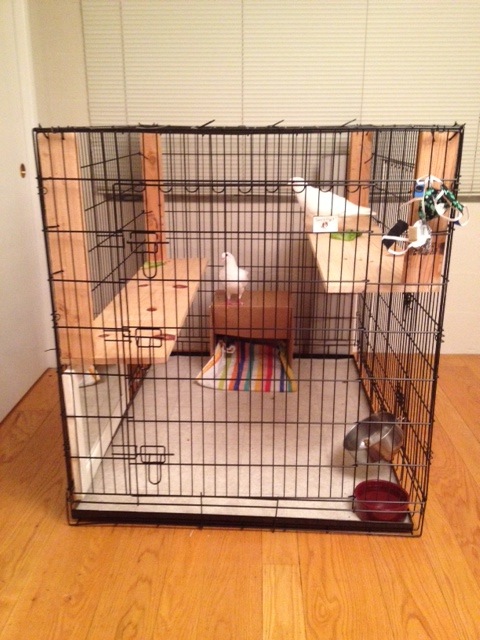
Large dog crates are great indoor cages but death-traps outside (too wide bar spacing- rats walk in, hawks, cats, raccoons reach in)

When predators can get/reach in, the enclosure is a death trap
There is no substitute for a safe enclosure. It doesn’t matter if people have guard dogs, high walls or insist they don’t have predators in their area. And it doesn’t matter if they’ve had their unsafe enclosure for X many years and never had a problem. Dodging a bullet yesterday is no promise you will dodge one tomorrow.
It’s not hard or expensive to create a predator and rodent-proof aviary. The enclosure needs to be completely sealed on all six sides with .5″ or .25″ hardware cloth. The hardware cloth floor needs to connect to the hardware cloth walls which connects to the hardware cloth ceiling and then pavers or boards can be put down to cover the hardware cloth for flooring and plywood or fiberglass can be added as a partial roof and siding to provide shelter, shade and privacy. Raccoon-proof the door latches and always secure them and the enclosure is predator and rodent-proof because the entire space is sealed by the hardware cloth. Rodents and predators will chew through wood and tunnel through dirt and rocks to eat the helpless birds unless there is the inpenetrable barrier of hardware cloth to keep them out.
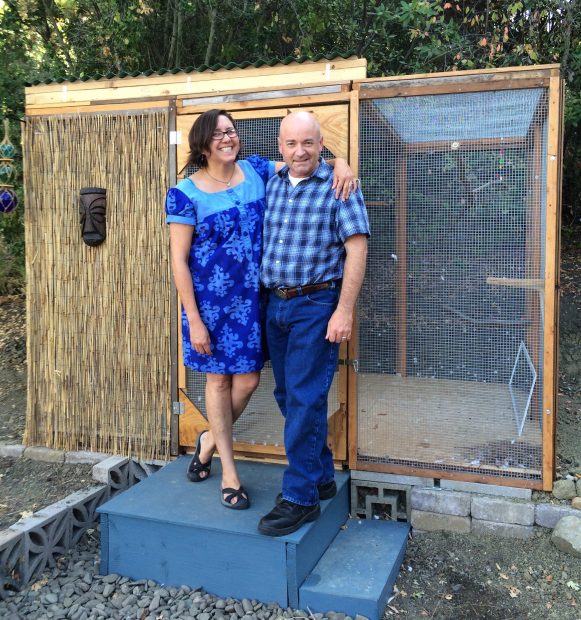
This aviary is a safe, happy home for adopted pigeons
Birds housed indoors need a big cage that will protect them from whatever pets are in the home as well as safe out-of-cage time daily for exercise, socializing and entertainment. See our care recommendations here.
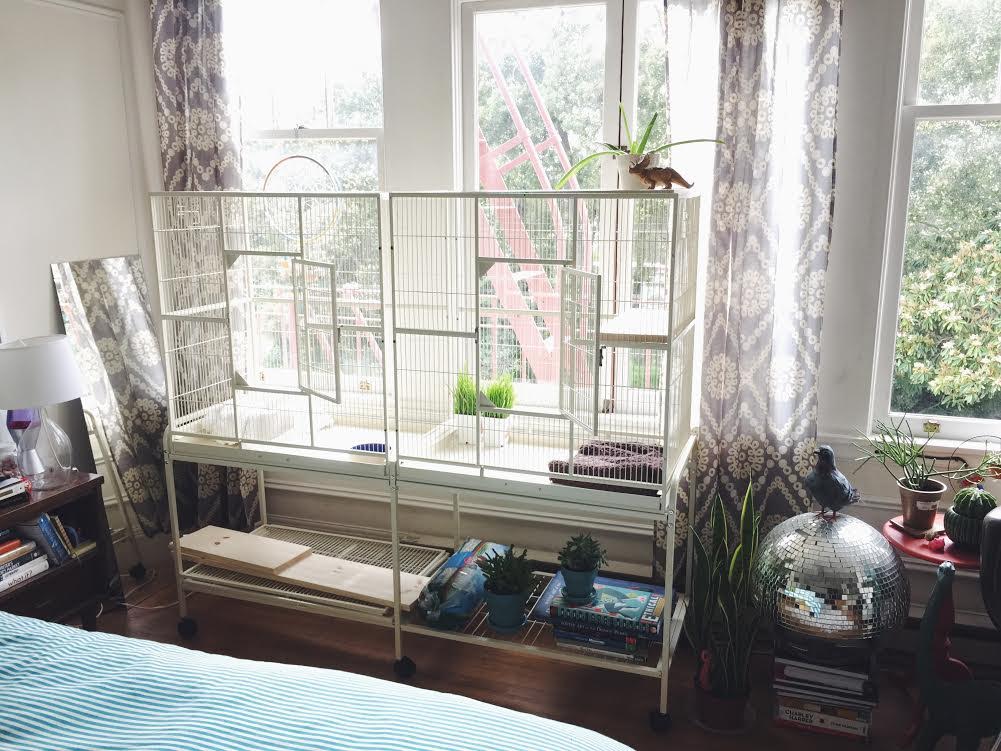
Palomacy recommends a double-flight cage indoors
When are you home and how long will the bird be alone? Will the bird have other birds for company or be kept alone? Pigeons and doves are not solitary birds and need an appropriate, compatible BFF, whether avian or human. A single bird should never be kept outside (too lonesome and stressful) and should always live indoors so as not to be completely isolated. (Pigeons and doves can live next door to chickens but should not be housed in with them as even one conflict will be catastrophic for the smaller bird.)
Can you provide proper lighting? Pigeons and doves require safe exposure to sunlight unfiltered by glass or avian-safe full spectrum lighting to be healthy. (We recommend FeatherBrite bulbs and you can learn the details of avian vision and lighting here.)
Are you aware of the dangers free-flying pet birds face? Please emphasize the importance of this point. Domestic birds aren’t safe flying wild skies (one of the reasons so many get hurt and lost and need rescue) and should not fly loose, even in the yard. Pet birds need to be secured in a carrier or with leashed pants or a harness and within an arm’s length when outdoors. (And clipped wings only prevent birds from flying while indoors. Clipped-wing birds can and do get airborne and lost outside all of the time!) Even when they’re in a cage, unless is it outside-safe, they should never be left alone. Hawks and raccoons and cats can grab and severely injure a bird right through the bars of an unsafe cage.
Do you breed and/or know how to prevent hatching? This is really important for a lot of reasons but most importantly, if someone is allowing baby birds to hatch, they are either going to be overcrowding their birds and/or selling/giving birds away, both of which put the birds at very high risk for all kinds of terrible things. Also, with so very, very many unreleasable birds literally dying for lack of homes, there is just no ethical way to bring more into the world. It’s a question of integrity and compassion.
Rose’s Recommendations
If you’ve been chosen by a bird as their rescuer, or if you need to rehome a bird (while we never like to see birds rehomed, sometimes it can’t be avoided), there are some basics you need to know when looking for a home. I like to ask the questions listed on Palomacy’s adoption application. It is thorough and has been being used long enough to have been proven (see application here). The high points for me are:
Who is caring for this bird/birds? I want to see that an adult is responsible for caring for the bird, or at the very least partnered and overseeing a young person. There is no such thing as a starter bird, and while there are many great young people out there, they need supervision.
Is the intended space safe and adequately sized for the birds who will be living in it? This applies to indoors and outdoors. Palomacy has all kinds of great guidelines for both on their website (outside enclosures & indoor cages)
Are there other pets in the home? Really important for several reasons, first to determine if special accommodations need to be made to their cage, and knowing what safety precautions need to be made. Other pets are not an automatic disqualifier, in fact many great adopters have cats, dogs and other pets. Do they know to keep birds separated from other pets? Cats, dogs, rats, ferrets, snakes, parrots, etc. can do serious harm to a pigeon or dove in a split second. Pigeons can also hurt doves due to the size difference and should not be housed together. (See Cats, Dogs, Birds, Oh My!)
Is the home smoke free? If the birds are inside, no smoking in the house is ok. Even if they are in separate areas or on separate floors, the air circulates through the same system. If outdoors, no smoking near the aviary. Bird lungs should never be subject to smoke or other fumes. Adopters should be aware of the dangers of using chemicals, aerosols, fragrances, and nonstick cookware around birds. Their respiratory systems are sensitive, and many “pet-safe” products are not safe for birds. (See Top Ten Household Dangers to Pet Birds and Bird Proof Your Home, though they recommend clipping wings and we don’t. Please note: Clipped wings only prevent birds from flying while indoors. Clipped-wing birds can and do get airborne and lost outside all of the time!)
Under what circumstances would they surrender the bird? This has helped me to identify some not so great adopters. When they say things like aggressiveness, or illness, that is a clue to me that they may not be as dedicated to working through issues with a bird, vs finding ways to help them.
Does the potential adopter/rescue have an avian vet, and are they willing and able to provide medical care if needed?
Is the adopter or rescue willing to allow a home visit (or send photos of bird’s living area) prior to adoption and provide updates? This will help you make sure they’re being taken care of.
Have they ever surrendered a pet, and if so, why? (See above.)
Are they planning on being a companion to a single bird/how many hours a day will they be spending with them? This is super important as no pigeon or dove should be left alone most of the day. They need companionship.
Are they committed to providing bird birth control? This is not negotiable.
No rehoming, selling, or any commercial use of the bird is ok.
Once you find a good home for your companion, try to check in from time to time to see how they’re doing. It’s always wonderful to have updates about a bird you’ve shared your life with, and this will allow you to make sure they’re being taken care of.
Did you read all the way through this and, already distraught about the prospect, are now feeling totally overwhelmed? Dry your tears and come join our Palomacy Help Group. Together we help birds get home.
Some happy rescue and adoption stories to inspire you
Worth Every Penny (And Freddie Too)


